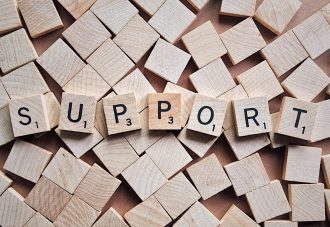The material was published in the Ukrainska Pravda
Have you ever thought that every day hundreds of Ukrainian civilians risk their lives helping others, but still have no adequate protection? Meanwhile, one simple step can fix this.
We are talking about volunteers who bring aid to the military on the front lines, evacuate civilians from the war zone, or deliver food and water to them.
On paper, they have both guaranteed state support and the opportunity to be insured. In practice, since February 24, 2022, only one injured volunteer and two families of the deceased have received assistance from the state. And organizations engaging volunteers very rarely insure them.
Now the Verkhovna Rada has registered the Draft Law No. 10040 “On Amendments to the Tax Code of Ukraine Regarding the Support of Volunteer Activities Under Martial Law”, which changes the situation for the better. We tell you what the difficulties with state aid are and what needs to be fixed.
Why is it important to work on volunteer insurance legislation?
Because insuring the life and health of volunteers for the duration of their involvement in volunteering is a non-obvious but very important element of their work. That is, organizations that engage volunteers should insure them, thus protecting them from medical expenses if they are injured.
If a volunteer dies, their family will not be left without support, alone with their grief and problems. It is about creating opportunities to support volunteers and their families. However, not enough attention is paid to this issue, to put it mildly.
How does volunteer insurance work abroad?
Czech Republic
The Voluntary Service Law of the Czech Republic establishes a list of guarantees for volunteers. In particular, Czech legislation defines the possibility for a non-profit organization to receive a state subsidy to cover the cost of insurance for the volunteer against damage to the volunteer’s property or health during the volunteer activity if the volunteer is engaged in an organization/project accredited by the Ministry of the Interior of the Czech Republic.
It is important to note that income received by a person in the form of assistance or services from insurance is not subject to taxation – this is a norm of Czech tax legislation.
Lithuania
The Special Law on Volunteer Activities, despite its very small scope and rather general regulatory framework, explicitly provides for the insurance for volunteers. Taking into account the duration and nature of volunteer activities, the organization that engages the volunteer may insure the volunteer with insurance companies or reimburse the volunteer for the insurance premiums. At the same time, the expenses reimbursed to the volunteer are not part of the volunteer’s income. Accordingly, volunteers, the expenses of organizations or institutions that engaged volunteers associated with insurance for volunteers are not subject to taxation.
How does Ukrainian legislation regulate volunteer insurance?
The Ukrainian Law “On Volunteer Activity” (namely, Part 2 of Article 5) defines the right of the organization and institution, which engages volunteers to its work, to insure their life and health for the period of volunteer activity.
That is, organizations have the right, but not the obligation, to insure their volunteers. Is this enough for volunteers to get insurance policies? Unfortunately, no.
However, even if this norm did not exist at all, nobody prevents organizations from taking care of volunteers voluntarily (we have already explained why it is necessary). So what is the reason why classic insurance – when an insurance company concludes a contract in favor of a volunteer – is not a common practice in Ukraine, to put it mildly? Because of the Tax Code!
In accordance with the provisions of this document, the amounts subject to Personal Income Tax (PIT) include: “insurance payments (insurance premiums), including under voluntary health insurance contracts paid by any resident for or on behalf of the taxpayer”.
This means that when a non-profit organization engages volunteers and insures them, it brings income (according to the terminology of the Tax Code) to such volunteers in the form of insurance premiums paid. Accordingly, the organization acts as a tax agent and gets a new obligation: to accrue, withhold and pay personal income tax to the budget on such “income” of the volunteer. That is, you will have to add another 18% (personal income tax) to the costs of the insurance policy, and then another 1.5% (military levy).
For example, if insurance for a volunteer costs UAH 2,000, an NGO or charitable organization must accrue and pay an additional UAH 390 of taxes for each person. And when it comes to large projects involving hundreds of volunteers, the costs become too high (try multiplying UAH 390 by 150 volunteers) to convince donors to cover them.
We can look at this from a different perspective: every million hryvnia allocated to insuring volunteers means UAH 195,000 in taxes. And if we follow the previous example, almost 100 more people could be insured with that money. So the question of priorities arises: either protection of volunteer’s life and health or tax revenues to the budget.
Or maybe the state itself has already done everything and protected the volunteers?
When the public once again reminds the Ministry of Finance that it is necessary to change the tax legislation on insurance of volunteers, they often emphasize that volunteers already have enough benefits and support from the state.
We are talking about Article 6 of the Law of Ukraine “On Volunteer Activity” and Resolution of the Cabinet of Ministers of Ukraine No. 604 of August 15, 2015, which determine the right of volunteers who have become disabled and families of deceased volunteers to receive a lump-sum monetary assistance from the state if “disability or death occurred as a result of injury (post-concussion syndrome, injury or mutilation) received during the provision of volunteer assistance in the area of the anti-terrorist operation, implementation of measures to ensure national security and defense, repulsion and deterrence of armed aggression of the Russian Federation in Donetsk and Luhansk Regions, implementation of measures necessary to ensure the defense of Ukraine, protection of the security of the population and interests of the state in connection with the military aggression of the Russian Federation against Ukraine and/or any other country against Ukraine, hostilities and armed conflicts”.
This is nowhere near a wording difficult for understanding [sarcasm intended]….
What are the problems associated with this lump-sum assistance from the state and does the mechanism for receiving it work?
So, some statistics. In response to a request from the Centre for Democracy and Rule of Law to the Ministry of Veterans Affairs of Ukraine, (within is in charge of the Interdepartmental Commission deciding on granting the lump-sum allowance, operates), we received the following information.
Since the adoption of the CMU Resolution No. 604 in 2015, which determines the procedure for assistance payment, the Interdepartmental Commission (as of November 2023) has received for consideration 28 applications for payment of lump-sum monetary assistance, including:
In response to 17 applications, decisions were made on the lump-sum monetary assistance totaling UAH 10.5 million, namely:
- 5 persons who became disabled – for a total amount of UAH 1.2 million, (in particular, one volunteer who was injured after February 24, 2022);
- 13 families of deceased volunteers – for a total amount of UAH 9.3 million, (including two families of volunteers who died after February 24, 2022);
- 8 applications for lump-sum monetary assistance were rejected due to the lack of documents containing sufficient evidence that the death or disability of a volunteer was caused by the circumstances specified in CMU Resolution No. 604;
- In response to 3 applications, the information is being clarified.
That is, during almost 10 years of Russia’s war against Ukraine, aid was received only 17 times, and only 1 volunteer who received disability and 2 families of deceased volunteers after the start of a full-scale war received help.
Quite telling statistics considering how many volunteers have actually been affected by the hostilities.
According to the data of the Charitable Organization “Coordination Humanitarian Center”, with regard to volunteers from Kharkiv Region alone, for the period since February 24, 2022, there is information about at least 15 people who have been affected while providing volunteer assistance, including 7 dead, 8 with various injuries ranging from post-concussion syndrome and shrapnel wounds to heart attacks.
Much can be said here about the problems of Resolution No. 604. In particular, it stipulates the possibility of providing a lump-sum allowance only if the volunteer was injured while helping the military (this also requires testimony from the head of the military unit who would confirm this). And if a volunteer died evacuating civilians, then “sorry” – his/her family will only be able to claim for assistance if they prove that it somehow helped the military, and the head of the unit gives such testimony.
And we can also talk about the fact that in April 2023, the provisions that allowed volunteers who helped civilians to qualify for assistance were removed from Resolution 604. As a result – we have 3 payments during a period of the full-scale war!
That’s why it’s worth working to create the conditions for organizations to insure volunteers themselves, take on the liability, and raise the funding to do so.
And we can’t do without changes to tax laws.
Draft law no. 10040 – why is it important to adopt amendments to the tax code to establish the practice of insuring volunteers?
Above, we have talked a lot about how insurance is regulated abroad and what instruments of social support for volunteers the state offers – so it is clear that changes in tax legislation alone will not push all non-profit organizations to insure volunteers (or, for example, to conclude agreements on the implementation of volunteer activities).
But in order to make it easier to raise funding for volunteer insurance and cover more people (instead of additional tax burden), so that insurance companies would be interested in developing and offering a product with better conditions for volunteers – however, it is worth starting with changes in tax legislation.
After all, despite the war, the practice of insuring volunteers is still a rare phenomenon in Ukraine, and this is extremely wrong. In comparison, in European countries, volunteers are insured regardless of the time they work. Even in safer spheres like helping in hospitals or nursing homes for the elderly.
Let’s get back to the Draft Law of Ukraine No. 10040 “On Amendments to the Tax Code of Ukraine Regarding the Support of Volunteer Activities under Martial Law” registered in the Verkhovna Rada on September 13. It proposes not to tax the expenses of non-profit organizations for volunteer insurance.
The situation with the Draft Law No. 10040 looks like that the PMs are not at all against settling the issue and defining the “income” of a volunteer in the form of the cost of insurance paid for hem by the organization as not subject to personal income tax. However, the Ministry of Finance took a principled position. It refers to the Memorandum on Economic and Financial Policy of June 19, 2023, concluded between Ukraine and the International Monetary Fund. After all, in it Ukraine undertook to refrain from any tax policy and administrative measures that may negatively affect the tax revenue base in 2023 and beyond.
However, we believe that it is a mistake to consider Draft Law No. 10040 through the lens of “negative impact on tax revenues”. The thing is that:
- It will be easier to raise donor funds for volunteer insurance projects if budgets do not have to set aside an additional 19.5% for taxes. This means that Ukraine will have more chances to attract foreign funding for important social initiatives in war conditions (and this will definitely help our budget rather than hurt it);
- Insurance companies that will create and sell products for organizations that engage volunteers are also income tax payers, paying taxes for the employees of such companies and other taxes;




